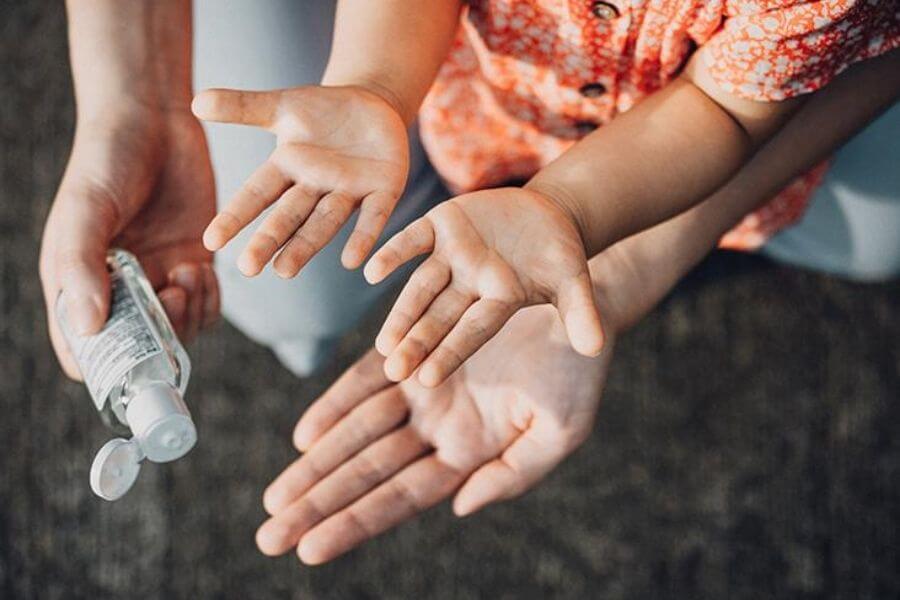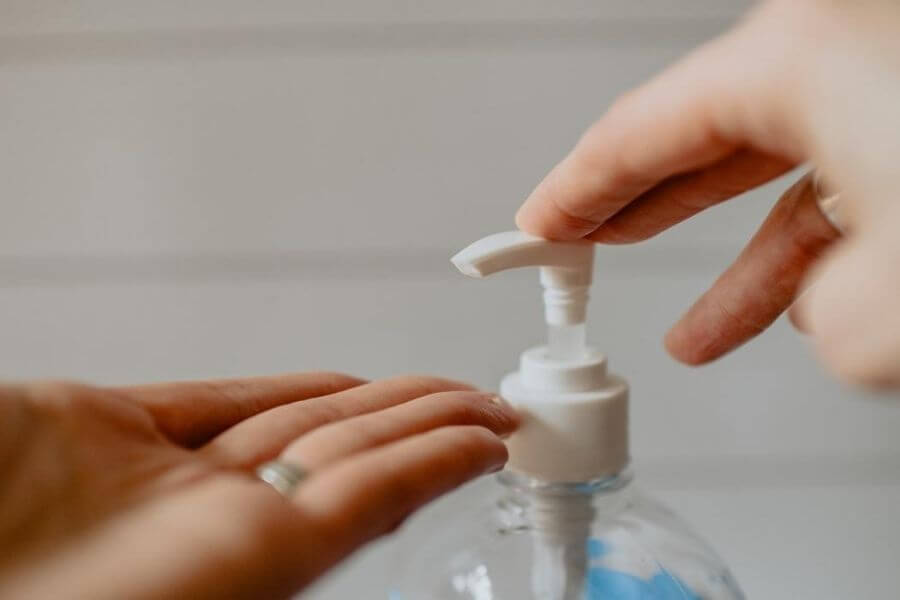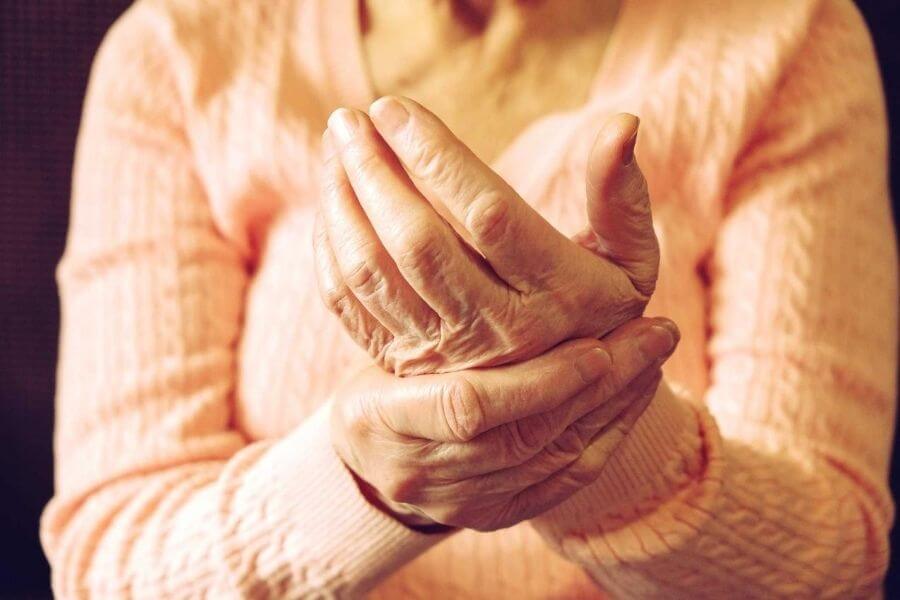Hand sanitizer is a gloopy alcoholic gel found everywhere to get rid of germs causing infectious disease.
Nowadays, we, consumers, carry this antiseptic rub and use it frequently in this pandemic COVID-19 situation. Most importantly, its conveniences when hand washing with water and soap are not nearby.
But do you realize we are using this sanitizer more and often? Research suggests that sanitizer adversely affects our skin and body, especially for children and pregnant women, as the active component of sanitizer is ethyl alcohol or benzalkonium chloride.
Let’s understand the consequences that will arise due to the increased use of sanitizer to our health. Also, in this article, we will discuss its unwanted adverse effects and its alternatives.
Effects From The Increased Use Of Sanitizer
Less Cleaning Efficiency

Using sanitizer is an ideal alternative way when there is no availability of water or soap nearby. However, it does not take off all your dirt, such as oil and fat residues. Only water and soap will help you to remove the oil deposits and give you softer and cleaner hands. If you use sanitizer after having some oily food, then it makes your hands more sticky and dirty than before.
These tiny bottles look very handy but are only useful when any other alternative isn’t available. Besides, it is not recommended for cleaning.
Decreases Our Immunity Level

We use sanitizer to keep all infections at bay and lower down chances of getting sick to stay healthy. But do you know how much use of sanitizer makes your immune system weak and put your health in danger? Especially, kids fall ill very easily as an ultra-clean environment make their immune system weak. Such conditions might create problems when they grow up.
A study suggests that frequent use of sanitizers by health care workers increases their risk of developing norovirus.
Dangerous For A Child

We tell our kids to wash their hands and sanitize them frequently. But do remember some facts before applying it to your baby’s skin.
It contains high alcohol content. Sanitizers usually contain 60% of ethanol, which is way much higher than any other alcoholic beverage. So, we recommend you to keep it away from your child.
The use of Sanitizer: Take a pea size of the sanitizer and rub your child’s hands vigorously after applying it till alcohol evaporates. Make sure its usage should be twice or thrice a day.
- Ask your child to keep your hands out of their mouth
- Always buy low alcohol content and without sweet smell sanitizer
- Take immediate medical consultation if a child ingests it
Contains Highly Toxic And Flammable Ingredients

As we discussed earlier, sanitizer mainly contains 60% ethanol; we all are aware that alcohol is a highly flammable chemical. Therefore, it is suggested to avoid using it near any gas appliances or barbecues. Due to this, it is considered hazardous waste in nature and dispose of properly.
Along with alcohol, the sanitizer also contains triclosan, an anti-bacterial and anti-fungal agent that is mainly used for cleaning purposes.
Triclosan gets absorbed into the skin quickly and enters the bloodstream. This action leads to many health complications such as allergies, cancer, hormonal disruption, and infertility.
Hormonal Issues

As I mentioned earlier, triclosan is the anti-bacterial agent, therefore, it cannot make out the difference between good and bad bacteria and act as an endocrine disrupter. Also, triclosan enhances the action of testosterone, which results in early puberty.
Skin Problems

Sanitizers contain active component ethanol along with some skin softeners and fragrances to mask the smell of alcohol. Frequent use of sanitizer may cause dryness and itching of skin. If you have sensitive skin, then the situation could be worst.
Alternatives For Sanitizers
1. Tea Tree Oil

This is an ideal natural homemade sanitizer to moisturize your skin and avoid infections.
How To Use
Add a few drops of tea tree oil and dilute it with distilled water. Puncture a Vitamin E capsule and squeeze it into the above mixture. Then add one teaspoon of castle soap and shake well. This homemade sanitizer does not contain alcohol or other harsh chemicals, so it is safe for children and adults.
Be attentive while preparing the mixture as the tea tree oil irritates the skin if the concentration is too high.
Hydrogen Peroxide

Hydrogen peroxide does kill germs, including most viruses and bacteria. When it interacts with bacteria, it oxidizes and decomposes the bacteria.
How To Use
The 3% concentrated hydrogen peroxide is available in the stores. To use as a sanitizer, dilute it with some parts of water. More than 3% concentration is highly dangerous to use.
Centre for Disease Control (CDC) suggests storing it in a dark-colored spray bottle to keep its concentration stable and effectiveness too.
Be cautious while handling hydrogen peroxide. It should be used alone, and is not wise to mix chemicals such as vinegar. A mixture of these chemicals may irritate your eye, skin, and respiratory system.
Plain Vinegar

This could be the next substitute when a sanitizer is not close to your place. Vinegar is the non-toxic, nonpolluting, and edible compound with an anti-bacterial effect to kill approximately 99% of bacteria.
Usually, 5% of Concentration bottles are available in the grocery store.
How To Use
Keep it in a small spray bottle. Apply it on entire palms of your hands and rub your hands until it dries.
The major concern is its smell. But it will dissipate quickly and leaves your hands clean and odor-free. But if you still dislike its smell, apply lavender oil on your hands.
Homemade Hand Sanitizer

Nothing can beat the old fashioned handwashing to prevent the spread of infections. But what if there is no scope of soap or water or any sanitizer with you. Not to worry, you can make your sanitizer at home.
Here I am suggesting you the method to prepare the sanitizer at home.
What Are The Ingredients Required?
- 60% Isopropyl Alcohol
- Aloe vera gel
- Few drops of Essential oil such as lavender, lemon, or tea tree oil.
According to the CDC, to make an effective germ-fighting sanitizer, the ratio should be 2:1 for alcohol to aloe vera gel. This proportion means 60% alcohol, which is the minimum concentration to make a sanitizer.
Additional Tips To Keep In Mind For Homemade Sanitizer
- Wash your hands thoroughly before making sanitizer
- Wash and clean required utensils before using them
- Make sure the alcohol for preparing sanitizer is not diluted
- Mix well all the ingredients properly until it is well blended
- Do not touch the mixture until it is ready to use.
- Most importantly, the improper proportion may lead to irritation, injury, or burns
For a large batch preparation WHO has the following formula:
- 4 cups Isopropyl alcohol
- ¼ cup of Hydrogen Peroxide
- 4 teaspoons of Glycerol
- 1 cup of Sterile distilled water’
You can half or double the amounts as per your need.
The next question how much time should you wait after preparing sanitizer?
You should wait at least for 72 hours once preparing the solution. As this time hydrogen peroxide kills the gems if some got trapped in solution while preparation.







